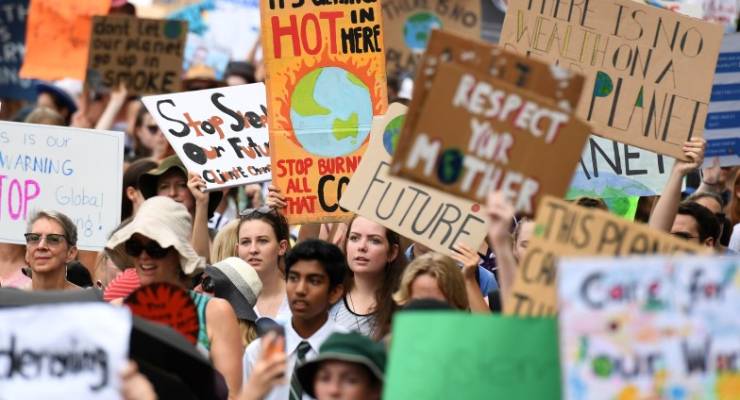
Just a month ago, G7 nations met in south-west France — with the raging forest fires in the Amazon near the top of the agenda. Despite stiff resistance from Brazil’s populist President Jair Bolsonaro, the other leaders demanded action in a region where temperatures have risen by 0.5 degrees celsius between 1985 and 2017. Despite all this, the fires are still burning and Brazil has suffered no consequences.
Last Friday, millions of mainly young people rallied in advance of this week’s climate summit at the United Nations in New York. However, a new poll in Australia suggests these large protests had little impact and changed few minds. An Essential poll, taken in advance of the protests and published Tuesday, showed just 6% of respondents said they would take part in the rallies, while 65% said they were unaware of them happening.
These findings support new research published this week by the Washington-based Brookings Institution, which looked at why the number of people “very concerned” about climate change remains stubbornly stuck at about 40%. While the percentage of those very concerned isn’t budging, the report showed that another number has been edging up — the proportion of the population believing “the seriousness of global warming is generally exaggerated”.
To back up these observations, Elaine Kamarck, the director of the Center for Effective Public Management at Brookings, also examined open-ended public opinion surveys conducted by Gallup between 1989 and 2019. In the last 3o years, Kamarck found that “environment” and “pollution” were only mentioned by 0.8% to 8% of respondents. According to Brookings’ most recent survey, only 3% of the public mentioned “the environment/pollution/climate change” as one of the most important issues currently faced.
“Given the severity of the climate crisis and the potential for existential damage to the human race and planet, the lack of intensity around the issue is simultaneously incomprehensible and totally understandable,” says Kamarck. “So let’s look at the latter. The explanations fall into at least four categories: complexity; jurisdiction and accountability; collective action and trust; and imagination.”
Here’s her potted explanation: complexity is the death knell of many modern public policy problems — and complexity is inherent in climate change. Jurisdiction is a problem, because it is hard to isolate who is responsible for what is happening across the globe: “In the absence of jurisdiction, everyone is accountable and therefore no one is accountable,” said Brookings.
Trust is a key reason why the number of people taking climate change seriously stubbornly remains at 40%. Democracies with strong individualist traditions — like the US and Australia — tend to have very low trust in government.
“The lack of trust in government … may be one of the foundational barriers to effective environmental action,” wrote Kamarck. “Writing in the journal Global Environmental Change, E. Keith Smith and Adam Mayer looked at 35 different countries. They found that a lack of trust in institutions blunts the public’s risk perceptions and therefore their willingness to support behaviours or policies to address climate change.”
So, if you don’t trust governments, you are sceptical about that government telling you what you need to do to counter climate change — especially if it comes at a personal cost. This scepticism is also heightened if the primary source of the warnings is a global body such as the UN.
“We have trouble imagining the potential devastation of climate change,” wrote Kamarck. “We have trouble trusting governments to lead us into much needed collective action. We have trouble defining the links between jurisdiction and accountability. And we have trouble understanding the causality in the first place.”
To build the public’s trust and support, Brookings says four things are needed. There should be heavy public and private investment in technology which can address climate change and mitigate its impact. Next, we should renew our focus on scientific literacy in schools and the promotion of STEM training in education. Thirdly, in order to change attitudes, we also need to harness the environmental engagement and civic-mindedness of millennials.
On the question of jurisdiction and accountability, public and private actors need to be rewarded and punished for their actions — starting with treaties, taxes, and regulations.
This leaves what many see as the biggest hurdle: trust in government. “Unless we restore trust in government, we are not likely to achieve significant collective action,” said Kamarck.
“Of course, all these things must proceed hand-in-hand. Awareness without the ability to hold corporations, countries, and individuals accountable will not result in major action on environmental issues. But measurement and accountability without an understanding of the connections between a warmer planet and dangerous climate changes will not result in major action either.”
It’s a sobering analysis at a time Scott Morrison says he wants everyone to stop worrying so much about climate change.
What do you think is the best way to increase the number of people who take climate change seriously? Write to boss@crikey.com.au. Please include your full name if you’d like to be considered for publication.








I think there are three other factors that are at least as important as those listed above, if not more so.
First is the natural human tendency to ignore threats and hope for the best. If you overlay this with a mistrust of science and scientists, together with a disinclination to see the world in terms of data and analysis, then sticking one’s head in the sand is a much more comforting course of action.
The second factor is that the general public has been told unremittingly by sources that are usually accepted as reliable authorities – politicians, journalists, the media and business leaders – that climate change fears are just a hoax, designed to make life unpleasant for ordinary people.
The third is that there is no irrefutable visible evidence of climate change effects. I know we have droughts and fires and cyclones, but even climate scientists are reluctant to ascribe particular events directly to climate change as cause.
Of the three, the first is human nature and can’t be changed, while by the time the last occurs it may well be too late to avert catastrophe. That only leaves the second. How do we change that?
Great analysis as usual Graeski.
Kerry O’Brien hinted at the answer on A&A the other night – journos need to step up and do their jobs properly, and attack their own if mendacity makes that a necessity….but it will take decades that we don’t have for that to happen.
Your third point is what will eventually turn things around, and when hell really breaks loose, the anger at those leaders who lied repeatedly and drove us in the wrong direction towards horror and disaster will be like the French Revolution.
Morrison and Abbott had best hope they are dead before we reach that point, or that angry assassins don’t appear unexpectedly.
I said this in the article about banning deniers from The Conversation but I’ll say it again: If it is all to be taken seriously maybe the political class should act like it. Do they wait for consensus on anything else?
Instead, the journalist arm of this vampiric class tut tuts the public. Oh dear only got millions of people onside with a complex concept that requires great change. Literally nothing we could do!
Breaking down trust in government has been a project of the Right for decades. James McGill Buchanan and the Koch Brothers were a match made in heaven for them, and hell for the rest of us. (I often wonder if, in Breaking Bad, the corrupt lawyer Saul Goodman’s real name of Jimmy McGill was a reference to Buchanan.) Read Nancy McLean’s “Democracy in Chains” for the story, or take a short cut through this link https://www.theatlantic.com/magazine/archive/2017/07/the-architect-of-the-radical-right/528672/
What this says is that about 60% of the population is too dumb or too greedy to understand that climate change is not a political problem, it is an existential problem smothered in the dishonesty of politics.
Mock trials would put the writing on the wall for climate criminals. Trials would serve as a focus for the anger of survivors of climatic disasters, and provide hope as the public becomes more worried by the clouds mounting on the horizon. Preparing for a trial would demonstrate to whistleblowers what evidence needs to be collected. Running a trial would show legislators what laws need to be put in place. Besides, noisy mock trials would provide endless circuses for the media!